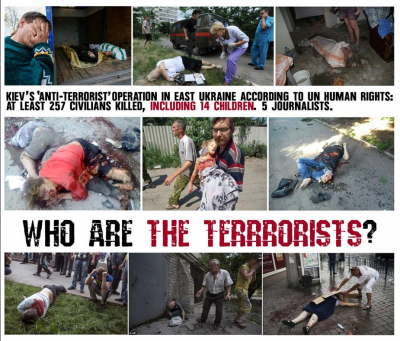Kiev Regime Launches “Total Assault” against East Ukraine Rebels

On Thursday, the Ukrainian Interior Ministry announced that it was conducting a “total assault” on “multiple fronts” against Donetsk and Luhansk, the two strongholds of pro-Russian separatists. In consultation with its allies in Europe and the US, the Ukrainian army is launching a brutal offensive.
AFP reporters near Donetsk reported heavy artillery fire as convoys of tanks and troop carriers advanced on the city. The Interior Ministry is expecting a month-long campaign to bring the two cities under government control. Spokespersons for the numerically inferior separatists said they would conduct fierce resistance.
The Kiev regime’s attacks have claimed numerous civilian casualties. In the Luhansk region, a bus taking miners to work was hit by artillery, and four workers died. The mining company DTEK subsequently announced the temporary closure of four mines to ensure employees’ safety. The press service of the insurgents in Luhansk also reported that a cancer centre was hit during the bombardment of the city.
The anti-Kiev regime rebels have been able to regroup and undertake their own military actions. In one incident, insurgents attacked a military convoy of government troops that was seeking to surround the rebels close to the Russian border.
“The column has been destroyed,” declared a spokesman of the people’s militia in Luhansk. The government confirmed that the incident was one of the most serious attacks for weeks, resulting in the death of at least 30 soldiers. Bloody battles also broke out near the Luhansk airport, which is controlled by the regime. In addition, the people’s militia reported it had shot down a Ukrainian military aircraft.
An adviser to the government denounced the separatists as “bloodthirsty scum,” threatening retaliation for the attacks. The regime had already announced at the beginning of the week that it has “nasty surprises” up its sleeve.
The Russian Foreign Ministry reported the artillery shelling of a border station by the Ukrainian army. At the time of the attack 230 refugees were present at the Gukowo checkpoint, the ministry said. Previously, dozens of shots had been fired at Russian territory.
There are also unconfirmed reports by the Russian newspaper Nezavisimaya Gazeta that Ukrainian troops would be mobilized near the Crimean peninsula. Crimea has been controlled by Russia since March, but the Ukrainian government continues to claim the peninsula, and Ukrainian officials have previously pledged to retake it.
The consequences of the Kiev regime’s offensive are already catastrophic. Military expert Dmitri Tymtschuk estimates that since mid-April, a total of about 200 military personnel have been killed and another 500 wounded in eastern Ukraine. Other estimates state that hundreds of insurgents have also been killed.
On Thursday the Deputy Health Minister Vasily Lasorischinez announced that at least 478 civilians had been killed since March this year. This figure includes 30 women and seven children. The figures were later denied by the ministry, with authorities claiming they lacked reliable figures.
On Friday, Amnesty International published a report claiming that both sides, the separatists in the east and the Ukrainian army, had carried out abductions and torture. The descriptions given by victims were “shocking,” the report said, including extreme humiliation and physical abuse.
Hundreds of thousands have been forced to flee their homes. Many have fled to Russia or to relatives and friends. With Donetsk and Luhansk now besieged, the supply situation is once again worsening. In Slavyansk, which the government finally retook after besieging the city and devastating it with artillery bombardments for months, the entire supply of electricity, gas, and water has broken down.
Intensified repression is bearing down on areas taken by the Ukrainian army last week. Authorities are demanding that Ukrainians inform on fellow countrymen who supported the separatists. According to Prime Minister Arseniy Yatsenyuk, all officials, police officers, judges and regional deputies are to be investigated and, if necessary, charged with treason.
The brutality of the offensive exposes the character of the Ukrainian government brought to power by the Western-backed coup in February. Ukrainian President Petro Poroshenko is in constant contact with his allies in Europe and the United States. On Thursday, the White House confirmed that Poroshenko telephoned US Secretary of State Joe Biden to discuss international action against Russia.
On the same day, the Ukrainian president declared in a telephone conversation with German Chancellor Angela Merkel that he was prepared to accept a cease-fire agreed by both sides. According to a German government spokesman, Merkel had asked Poroshenko “to demonstrate proportionality and protect the civilian population in its legitimate action against the separatists.” However, events on the ground tell a very different story.
In an interview with Euro News, NATO Secretary General Anders Fogh Rasmussen stated that the military alliance must be prepared to consider Russia an adversary, and that it had modernized its armed forces in recent years. “This is why I urge the allies of NATO to increase their defense budgets and accelerate the modernization of our armed forces,” he said.
Russia’s reaction to the threats has been very defensive. A spokesman for the Russian Foreign Ministry said on Thursday that the country was ready to allow the Ukrainian-Russian border to be monitored by representatives of the Organization for Security and Cooperation in Europe (OSCE). Ukrainian border guards would be accepted only when a stable ceasefire was agreed.
Yatsenyuk is using the military offensive in the east to escalate attacks on workers across Ukraine. At the All-Ukrainian Agricultural Forum, the premier announced on Thursday that his government would carry out the most extensive privatization of state enterprises in the country’s history. A bill listing the companies concerned is to be made public next week.

